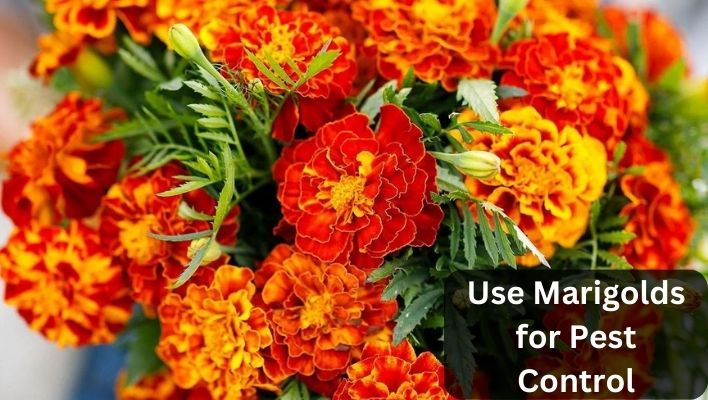Marigolds as an insect repellent; Marigolds, with their radiant colors and distinct fragrance, have long been admired as ornamental flowers. However, their benefits extend far beyond their aesthetic appeal.
These beautiful blooms possess natural properties that make them excellent insect repellents. From mosquitoes and aphids to nematodes and whiteflies, marigolds have the power to deter a wide range of common garden pests.
But what makes marigolds so effective? It all comes down to their unique chemical composition. Marigolds produce compounds like thiophenes and limonene, which emit a strong scent that repels insects.
This natural defense mechanism not only protects the marigold plant itself but also acts as a barrier, safeguarding nearby plants and outdoor areas from insect invasions.
In this article, we will delve into the specific benefits of marigolds as an insect repellent, explore different varieties to consider for your garden and provide practical tips on how to maximize their insect-repelling potential.
Get ready to unlock the secrets of marigolds and discover a natural and beautiful solution to keep those bothersome insects at a safe distance. Let’s dive in and harness the power of marigolds as a natural insect repellent.
Why Use Marigolds?
When it comes to insect repellents, marigolds stand out as a brilliant choice for several compelling reasons. These vibrant and aromatic flowers possess unique properties that not only add beauty to your garden but also act as natural bug deterrents.
First and foremost, marigolds boast a strong and distinctive scent that insects find highly unpleasant. While we may enjoy the pleasant aroma of marigolds, bugs, especially mosquitoes, and aphids, can’t stand it.
The pungent smell acts as a natural barrier, keeping them at a safe distance from your precious plants and outdoor spaces.
In addition to their scent, marigolds flaunt a striking display of colors, ranging from vivid yellows and oranges to fiery reds. Interestingly, some insects, like whiteflies, are attracted to specific colors, but marigolds overpower them with their vibrant hues, confusing and deterring these unwanted visitors.
The secret weapon of marigolds lies in their natural compounds, such as pyrethrin and limonene. Pyrethrin, found in many insect repellents, is an organic compound extracted from marigold flowers.
Its potent insecticidal properties disrupt the nervous systems of insects, effectively paralyzing and repelling them.
Limonene, another powerful compound found in marigolds, not only repels insects but also masks the scent of more enticing plants, making your garden less appealing to pests.
Marigolds have proven their worth in deterring a wide range of insects, including mosquitoes, aphids, whiteflies, and nematodes. Unlike chemical pesticides that often target specific pests, marigolds offer a broad-spectrum repellent, keeping various intruders at bay.
One of the most significant advantages of using marigolds as an insect repellent is their safety and eco-friendliness. Chemical pesticides may effectively eliminate pests, but they also pose risks to beneficial insects, birds, and even humans.
Marigolds, on the other hand, are non-toxic and pose no threat to beneficial creatures, making them a sustainable and environmentally responsible choice for pest control.
Incorporating marigolds into your garden not only protects your plants from destructive insects but also promotes a healthier ecosystem.

Marigolds as an Effective Insect Repellent
Marigolds not only possess natural insect-repellent properties but can also be strategically used to create bug-free zones in various areas, such as gardens, balconies, and outdoor seating areas.
Here’s a step-by-step guide on how to make the most of these floral guardians:
Planting Marigolds:
- Choose a sunny location for your marigold bed or container. Marigolds thrive in full sun.
- Prepare the soil by loosening it and adding compost or organic matter for better drainage.
- Sow marigold seeds or transplant seedlings according to the recommended spacing, usually a few inches apart.
- Water the plants thoroughly after planting, ensuring the soil remains consistently moist during the germination period.
- As the marigolds grow, thin them out if needed to maintain proper spacing and allow air circulation.
Caring for Marigolds:
- Water marigolds regularly, providing enough moisture to keep the soil evenly moist but not waterlogged.
- Apply a balanced organic fertilizer once a month to promote healthy growth and vibrant blooms.
- Pinch off spent flowers (deadheading) regularly to encourage continuous blooming.
- Monitor for pests and diseases. While marigolds repel many insects, occasional visitors may still appear. Use organic pest control methods if necessary.
- Mulch around the base of marigold plants to suppress weeds and retain moisture.
Companion Planting:
- Take advantage of marigolds’ insect-repellent properties by strategically planting them alongside other susceptible plants.
- Companion plant marigolds with vegetables like tomatoes, peppers, and beans to deter pests like aphids, whiteflies, and nematodes.
- Plant marigolds near roses to fend off aphids and other pests that commonly affect these beautiful flowers.
- Consider interplanting marigolds with herbs like basil and mint to create a barrier against mosquitoes and other flying insects.
Remember, marigolds work best when planted in clusters or as borders around vulnerable plants. Their scent and presence create a protective shield, keeping many pests at bay. Experiment with different marigold varieties, such as French marigolds (Tagetes patula) or African marigolds (Tagetes erecta), to find the ones that work best in your specific garden environment.
By incorporating marigolds strategically and caring for them properly, you can enjoy a visually stunning garden while naturally deterring pests. These versatile flowers not only bring beauty but also offer an eco-friendly solution for a bug-free outdoor space. Embrace the power of marigolds and watch as your garden thrives under their protective watch.

Common Insects Repelled by Marigolds
Marigolds are known for their ability to repel a variety of bothersome insects, making them a valuable addition to any garden. Let’s take a closer look at some of the common pests that marigolds can deter and how these vibrant flowers work their magic:
- Mosquitoes: We all know how irritating mosquitoes can be, not to mention the potential health risks they pose as carriers of diseases. Marigolds emit a scent that repels mosquitoes, keeping them at bay. By planting marigolds near outdoor seating areas or using marigold-based repellents, you can create a more pleasant and mosquito-free environment.
- Aphids: Aphids are tiny, sap-sucking insects that can wreak havoc on your plants, causing stunted growth and distorted leaves. Fortunately, marigolds act as natural deterrents against aphids. The strong scent of marigolds masks the attractant odors of the host plants, making it less likely for aphids to infest your garden. Planting marigolds near aphid-prone plants, such as roses or vegetables like lettuce and beans, can help protect them from these sap-sucking pests.
- Whiteflies: Whiteflies are small, flying insects that feed on the sap of plants, leaving behind sticky honeydew and causing yellowing of leaves. Marigolds emit a scent that repels whiteflies, reducing the chances of infestation. These vibrant flowers can be particularly effective when planted near crops like tomatoes and cucumbers, which are often targeted by whiteflies.
- Nematodes: Nematodes are microscopic worms that live in the soil and can cause damage to plant roots, leading to wilting and poor growth. Marigolds release natural compounds that repel nematodes, acting as a natural form of pest control. Planting marigolds as a cover crop or rotating them with susceptible plants can help deter nematodes and promote healthier soil.
other insects and pests marigolds deter include; Cabbage worms, Tomato hornworms, Mexican bean beetles, Squash bugs, Thrips, Leafhoppers, Mealybugs, Spider mites, and Cucumber beetles just to name a few.
By incorporating marigolds in your garden, you not only add beauty but also naturally combat these troublesome insects. It’s important to note that while marigolds can deter many pests, they may not eliminate them.
However, when combined with proper garden management practices, marigolds can significantly reduce pest populations and minimize the need for chemical interventions.
Remember, every garden is unique, and the effectiveness of marigolds may vary. Observing and experimenting with different planting strategies will help you find the best approach for your specific garden environment.
Using Marigolds in the Garden
Marigolds not only repel insects but also offer a visually stunning addition to your garden. Here are some practical tips on incorporating marigolds for effective pest control through companion planting:
- Surround vulnerable plants: Create a protective barrier by planting marigolds around pest-prone plants. The strong scent acts as a deterrent, keeping insects at bay. This technique works well for plants like roses, tomatoes, cucumbers, and beans.
- Interplanting: Mix marigolds with other vegetables and herbs to maximize their insect-repellent properties. For instance, you can plant marigolds between rows of cabbage or lettuce to deter pests like cabbage worms. Basil and mint also benefit from marigold companionship as they repel mosquitoes and other flying insects.
- Succession planting: Extend the insect-repelling effect of marigolds by practicing succession planting. As the bloom of one batch of marigolds fades, replant new ones in their place to maintain a continuous barrier against pests throughout the growing season.
- Mixed flower beds: Create vibrant and diverse flower beds by combining marigolds with other companion plants. For example, planting marigolds alongside petunias, geraniums, or zinnias not only enhances visual appeal but also provides a natural defense against common garden pests.
- Pot and container gardens: Marigolds are excellent choices for container gardens. Plant them in pots alongside your favorite herbs or vegetables to naturally repel insects and add a pop of color to your patio or balcony.
Here’s a list of pest-prone plants that can benefit from marigold companionship:
- Roses (to deter aphids)
- Tomatoes (to deter whiteflies and hornworms)
- Cucumbers (to deter cucumber beetles)
- Beans (to deter Mexican bean beetles)
- Brassicas (such as cabbage, broccoli, and kale, to deter cabbage worms)
- Lettuce (to deter slugs and snails)
- Carrots (to deter carrot flies)
- Squash and zucchini (to deter squash bugs)
Remember to plant marigolds near or around these plants to maximize their protective effect. While marigolds are effective in repelling many pests, it’s important to monitor your garden regularly for any signs of infestation and take necessary action if needed.
By strategically incorporating marigolds in your garden, you can naturally deter pests, reduce the need for chemical interventions, and create a vibrant and pest-free haven for your plants.
So, get creative and explore the wonderful world of marigolds as you unleash their power in your garden.

Are there any specific marigold varieties recommended for repelling certain pests?
Yes, certain marigold varieties are known to be particularly effective in repelling specific pests. Here are some recommended marigold varieties for repelling common garden pests:
- Tagetes patula (French marigold): This compact marigold variety is known for its strong scent, which repels aphids, whiteflies, and nematodes. It is especially effective against aphids, making it a great choice for companion planting with roses and other aphid-prone plants.
- Tagetes erecta (African marigold): African marigolds have larger blooms and a robust scent that can repel a wide range of pests, including aphids, whiteflies, and even mosquitoes. They are particularly effective in deterring nematodes, making them beneficial for planting vegetables like tomatoes and cucumbers.
- Tagetes lucida (Mexican mint marigold): This marigold variety is known for its aromatic foliage, which can help repel insects like mosquitoes and deer flies. Its strong fragrance makes it a popular choice for natural insect repellents and can be planted in outdoor seating areas or near entrances to keep bugs at bay.
- Tagetes tenuifolia (Signet marigold): Signet marigolds have finely divided, fern-like foliage and small, dainty flowers. Their fragrance is slightly citrusy and can help deter a variety of pests, including aphids and whiteflies. They are excellent choices for bordering vegetable gardens or interplanting with other herbs and flowers.
When choosing marigold varieties for pest control, opt for those with strong scents and vibrant colors, as these tend to be more effective in repelling insects. Remember to consider the specific pests you want to target and select the appropriate marigold variety accordingly.
By selecting the right marigold varieties for your garden, you can enhance their pest-repellent properties and create a healthier, more vibrant environment for your plants. Enjoy the beauty of marigolds while harnessing their natural abilities to deter unwanted pests.
FAQ
Can marigolds completely eliminate insects from my garden?
While marigolds are effective in repelling many insects, they may not completely eliminate all pests from your garden. Marigolds act as a deterrent by emitting a scent that repels insects, creating a protective barrier.
However, some persistent pests may still find their way into your garden. It’s important to remember that marigolds are part of an integrated pest management approach and should be used in conjunction with other gardening practices such as proper plant care, crop rotation, and regular monitoring for pests.
By combining these strategies, you can significantly reduce pest populations and minimize the need for chemical interventions.
Do marigolds repel all types of insects?
Marigolds have insect-repellent properties that are effective against many common garden pests. They are known to repel insects such as mosquitoes, aphids, whiteflies, nematodes, cabbage worms, tomato hornworms, and cucumber beetles, among others. However, it’s important to note that marigolds may not repel all types of insects.
Some pests may be less affected by the scent of marigolds or may have adaptations that allow them to tolerate the presence of marigolds.
It’s always recommended to observe your garden and take appropriate measures for pest control if needed, in addition to using marigolds as a natural deterrent.
How long do marigolds remain effective as an insect repellent?
A: Marigolds remain effective as insect repellents as long as they are in bloom and actively release their strong scent. The volatile compounds responsible for repelling insects are present in the flowers and foliage of marigolds.
Therefore, the effectiveness of marigolds as an insect repellent is directly related to their blooming period. Different marigold varieties have varying bloom durations, but generally, marigolds bloom continuously throughout the growing season, providing an extended period of insect-repelling benefits.
It’s important to practice succession planting or replace spent marigolds with new ones to maintain a consistent barrier against pests.
Can I use marigolds indoors to repel insects?
Yes, marigolds can be used indoors to repel insects, particularly in areas such as kitchens, windowsills, or near entrances. Indoor potted marigolds can help deter insects like flies, mosquitoes, and gnats.
Place potted marigolds in well-lit areas where they can receive sufficient sunlight. Remember that indoor conditions may be different from outdoor environments, so proper care and maintenance, including watering and providing adequate airflow, are essential for the health and effectiveness of indoor marigolds.
Keep in mind that while marigolds can help repel insects indoors, they may not be as effective as other methods specifically designed for indoor pest control.
Conclusion
Marigolds have proven themselves to be not only beautiful flowers but also powerful allies in the battle against garden pests.
Throughout this article, we’ve explored the unique properties of marigolds that make them effective as natural insect repellents. Their strong scent, vibrant colors, and natural compounds work together to repel a wide range of pests.
We’ve learned that marigolds can deter insects such as mosquitoes, aphids, whiteflies, nematodes, and many others.
By strategically using marigolds in your garden, whether through companion planting, surrounding vulnerable plants, or interplanting, you can create a natural shield against these pesky intruders.
Marigolds offer several advantages over chemical alternatives. They provide a safe and eco-friendly option, reducing the need for harsh pesticides that can harm beneficial insects and pollinators. Additionally, marigolds add beauty to your garden, attracting beneficial insects like bees and butterflies.
Remember that marigolds may not completely eliminate all insects from your garden, but they are a valuable part of an integrated pest management approach.
By combining marigolds with proper plant care, regular monitoring, and other pest control practices, you can significantly reduce pest populations and create a healthier, thriving garden.
